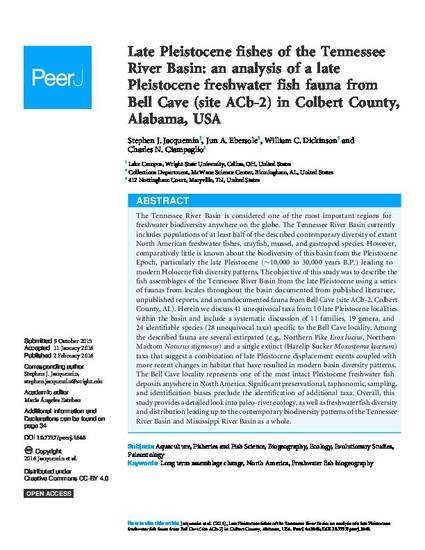
The Tennessee River Basin is considered one of the most important regions for freshwater biodiversity anywhere on the globe. The Tennessee River Basin currently includes populations of at least half of the described contemporary diversity of extant North American freshwater fishes, crayfish, mussel, and gastropod species. However, comparatively little is known about the biodiversity of this basin from the Pleistocene Epoch, particularly the late Pleistocene (∼10,000 to 30,000 years B.P.) leading to modern Holocene fish diversity patterns. The objective of this study was to describe the fish assemblages of the Tennessee River Basin from the late Pleistocene using a series of faunas from locales throughout the basin documented from published literature, unpublished reports, and an undocumented fauna from Bell Cave (site ACb-2, Colbert County, AL). Herein we discuss 41 unequivocal taxa from 10 late Pleistocene localities within the basin and include a systematic discussion of 11 families, 19 genera, and 24 identifiable species (28 unequivocal taxa) specific to the Bell Cave locality. Among the described fauna are several extirpated (e.g., Northern Pike Esox lucius, Northern Madtom Noturus stigmosus) and a single extinct (Harelip Sucker Moxostoma lacerum) taxa that suggest a combination of late Pleistocene displacement events coupled with more recent changes in habitat that have resulted in modern basin diversity patterns. The Bell Cave locality represents one of the most intact Pleistocene freshwater fish deposits anywhere in North America. Significant preservational, taphonomic, sampling, and identification biases preclude the identification of additional taxa. Overall, this study provides a detailed look into paleo-river ecology, as well as freshwater fish diversity and distribution leading up to the contemporary biodiversity patterns of the Tennessee River Basin and Mississippi River Basin as a whole.
Available at: http://works.bepress.com/stephen-jacquemin/28/
